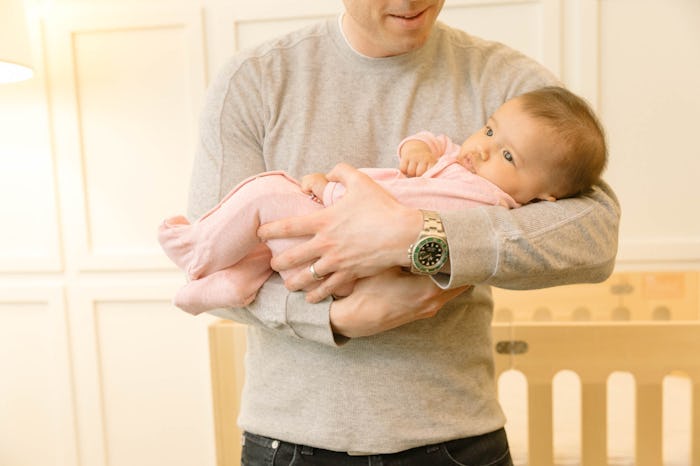Life
Miss Your Kid's Antibiotics Dose? Read This Before You Double Up
'Tis the season for the flu and all the booger-y grossness you can possibly fathom — and then some. Whether your child picks up a virus or infection at daycare or is that kid who likes to mouth all of the instruments at music class (yes, you, my lovely daughter), chances are likely you will be taking a trip to the doctor once or twice. Sometimes, it even means a solid dose of medicine. But, while you set forth with the best of intentions to stay on schedule, what should you do if your child misses an antibiotics dose?
"If your child misses a dose of antibiotics, give the dose as soon as you remember," Texas-based Dr. Eboni Hollier, who is board-certified in both general and developmental and behavioral pediatrics, tells Romper in an email interview. "If it's getting close to the time to give the next dose, skip that dose entirely. It is generally not recommended to give a double dose of antibiotics due to a missed dose."
Giving two doses of an antibiotic, antiviral, or anti-fungal medication can cause diarrhea or stomach upset, according to Pediatric Partners. Like Hollier, the website noted that "if you've missed a dose of an antibiotic by only an hour or two, give the dose as soon as you remember and then proceed with the next ones." But if you realize your error as you are coming up against your next dose, give an extra dose at the end of the prescription, for instance on day 11, if it's a 10-day prescription.
Hollier says if you are unsure, then you can also always check the drug information sheet provided by the pharmacy for instructions on what to do in the event of a missed dose. As always, when in doubt, check with your child's doctor or pharmacist.
Experts are quick to caution an overuse of antibiotics, saying that doing so will eventually lead to the medicines not working. In most cases upper respiratory infections, like a sore throat and bronchitis, can be cured with rest, drinking fluids, and administering children's acetaminophen or ibuprofen to relieve pain or fever, according to Health.
Soothe your little one's sore throat with frequent ice pops, warm liquids, and lozenges (for kids age 4 or older), according to KidsHealth. You can also try a warm compress on their nose of forehead if they are experiencing sinus pressure. My 2-year-old daughter recently had a sore throat and cough, and we had success with Zarbee's Naturals Baby Cough Syrup ($7, Target) and Zarbee's Naturals Baby Chest Rub ($6, Target). It at least helped ease the endless coughing that was making rest impossible.
If your child does end up with a prescription for an antibiotic, there are a few rules to keep in mind. The first, and perhaps most obvious, is to only administer medicines that are prescribed by a health professional. That might seem obvious, but it's not uncommon for people to think it's OK to share antibiotics or use leftover antibiotics from a previous prescription — both major no-nos, according to the World Health Organization (WHO).
WHO recommends preventing infections by avoiding contact with sick people — which is sometimes easier said than done when it comes to play dates, a need for childcare, and regular playground outings. That's why it's important to encourage hand washing by using language that helps a child understand its importance. Instead of, "Eww, that's gross!" Say things that explain why they should wash their hands. For example, "Our hands are probably germy from playing at the park, so let's wash them!" Hand washing songs are also helpful. Try tunes like, "Wash, Wash, Wash Your Hands" to the tune of "Row, Row, Row Your Boat."
The truth is, kids are gross. You won't be able to intercept every instrument situation — take it from me. But we do the best we can, right?
Check out Romper's new video series, Romper's Doula Diaries:
Watch full episodes of Romper's Doula Diaries on Facebook Watch.
